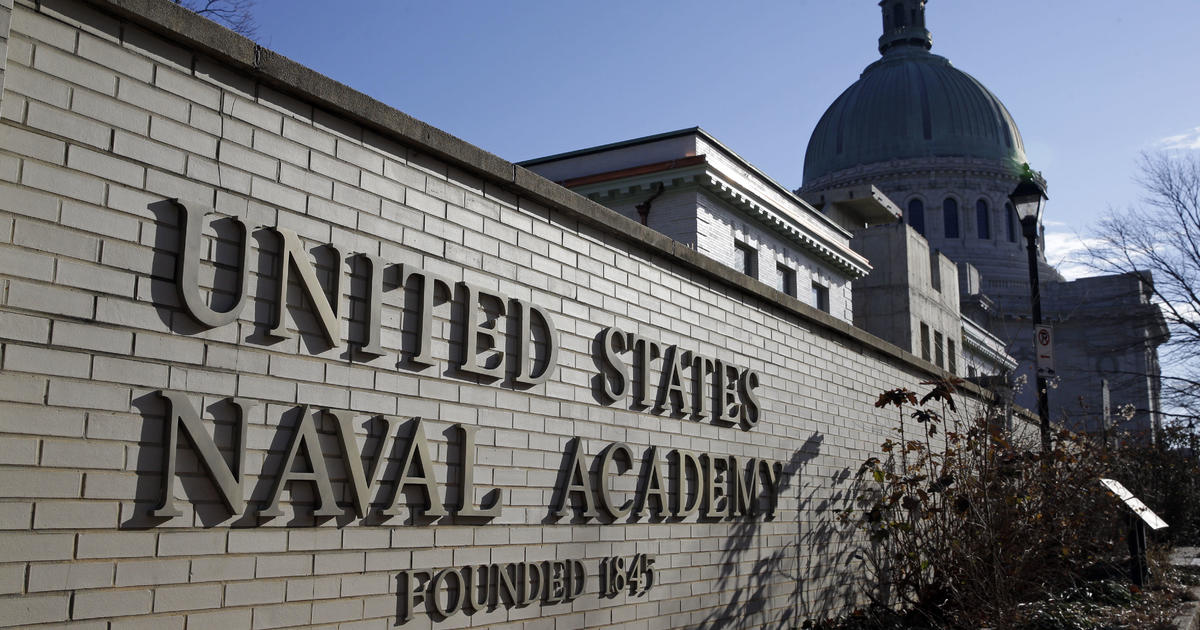Washington — A federal district court on Friday upheld the U.S. Naval Academy’s race-conscious admissions policies, rejecting a challenge brought by the group Students for Fair Admissions following the Supreme Court’s landmark decision ending affirmative action in higher education.
U.S. Senior District Judge Richard Bennett wrote in a 179-page decision that the Naval Academy “established a compelling national security interest in a diverse officer corps” for the U.S. Navy and Marine Corps, and tied its use of race in admissions to “the realization of an officer corps that represents the country it protects and the people it leads.”
Bennett said the academy’s race-conscious admissions policy must receive deference extended to military judgments, which he said are set by the president and not the federal judiciary.
“The Naval Academy’s race-conscious admissions policies are narrowly tailored to further a compelling governmental interest in national security,” he wrote. “Defendants have proven that the Naval Academy’s limited use of race in admissions has increased the racial diversity of the Navy and Marine Corps, which has enhanced national security by improving the Navy and Marine Corps’ unit cohesion and lethality, recruitment and retention, and domestic and international legitimacy.”
A spokesperson for the Naval Academy said it is reviewing the court’s decision. Edward Blum, president of Students for Fair Admissions, said the group is “disappointed” by the ruling and will appeal.
“It is our hope that the U.S. military academies ultimately will be compelled to follow the Supreme Court’s prohibition of race in college admissions,” he said in a statement.
The challenge to the Naval Academy’s admissions policies was brought by Students for Fair Admissions in October 2023, just three months after the Supreme Court ruled that race-conscious admissions policies used by colleges and universities were unconstitutional. The group was behind the cases that led the high court to reject affirmative action in higher education in June 2023.
Students for Fair Admissions’ lawsuit came in response to a footnote in the majority opinion authored by Chief Justice John Roberts, which said the decision did not apply to the nation’s service academies. The organization sought to expand the Supreme Court’s affirmative action ruling to include the Naval Academy, based in Annapolis, Maryland, and the U.S. Military Academy in West Point, New York, which it separately sued in September 2023.
Students for Fair Admissions had argued that the Naval Academy’s admissions process was unconstitutional because it discriminated based on race. But the service academy argued that a racially diverse officer corps is necessary to execute the Navy’s mission and provide national security.
The court held a nine-day trial in September, which included testimony from 18 witnesses.
“The evidence in this case clearly indicates that the Naval Academy does not employ quotas, admit candidates based solely on their race or ethnicity, or place minority candidates on separate admissions tracks,” Bennett, who served over 20 years in the U.S. Army Reserve and Maryland National Guard, wrote.
The court found that the Naval Academy’s admissions policies mandate that race be taken into consideration only in limited circumstances. In each of those instances, Bennett said, race is “nondeterminative” and is one of several factors used to assess an applicant’s potential as a midshipman and eventual officer in the Navy or Marine Corps.
Additionally, the court found that the Naval Academy has implemented “extensive race-neutral factors” within and outside of its admissions policies in an effort to achieve diversity, such as socioeconomic factors, whether an applicant has faced adversity or if a candidate is a first-generation college student. The court also highlighted the academy’s recruiting and outreach efforts, which it said are “extensive and multifaceted.”
“The Naval Academy has established a compelling national security interest in a diverse officer corps in the Navy and Marine Corps. Furthermore, that interest is indeed measurable, and the Academy’s admissions program is narrowly tailored to meet that interest,” Bennett wrote. “In short, this court defers to the executive branch with respect to military personnel decisions.”
The Naval Academy typically receives between 14,000 and 16,000 applicants and admits roughly 1,000 midshipmen each year. Those students then enter the Navy or Marine Corps officer corps for a five-year commitment after graduating. The admissions process is rigorous — in addition to submitting SAT or ACT results, a high school transcript and personal information, prospective students must also participate in an interview and receive a nomination from a member of Congress, the vice president, president or secretary of the Navy. Applicants must also pass a physical exam performed by a Defense Department review board.

